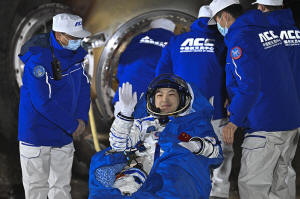|
In recent years, the country's space program has brought back
rocks from the moon and landed a rover on Mars. It aims to put a
person on the moon by 2030, which would make China the second
nation after the United States to do so.
The space station astronauts returned after welcoming a
replacement three-person crew last week for the latest six-month
mission. The new team of one woman and two men will conduct
experiments, carry out spacewalks and install equipment to
protect the station from space debris.
A space agency official said in April that Tiangong had
maneuvered several times to avoid debris and had partially lost
power when the solar wing's power cables were hit by debris,
according to a report from the official Xinhua News Agency.
China is among the countries that have created space debris,
including the reported break-up of a rocket stage in August
during the launch of the first 18 satellites for a global
internet service similar to Starlink, the still-growing
constellation of satellites operated by Elon Musk's SpaceX.
Tiangong, which means Heavenly Palace, was completed two years
ago and orbits the earth.
Only Chinese astronauts have gone to the space station so far,
but a space agency spokesperson said last week that China is in
discussions to select and train astronauts from other nations to
join the missions, Xinhua reported.
Astronauts from several nations have traveled to the
International Space Station, but China is blocked from that
program mainly because of U.S. concerns over the military's
involvement in China's space program.
China laid out an ambitious plan last month to become a leader
in space science research by 2050 in conjunction with its
advances in space exploration.
All contents © copyright 2024 Associated Press. All rights
reserved |
|




